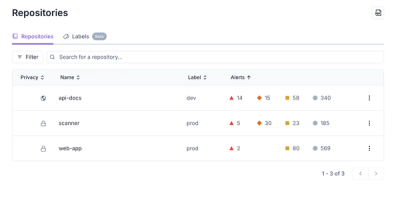
Product
Redesigned Repositories Page: A Faster Way to Prioritize Security Risk
Our redesigned Repositories page adds alert severity, filtering, and tabs for faster triage and clearer insights across all your projects.
@typescript-eslint/types
Advanced tools
The @typescript-eslint/types package is part of the TypeScript-ESLint project, which provides a TypeScript parser for ESLint and utilities for working with TypeScript and ESLint together. This specific package contains TypeScript definitions for ESLint-specific types, making it easier to work with ESLint configurations, rules, and plugins in a TypeScript environment. It is primarily used by developers who are creating custom ESLint rules or configurations and want to leverage TypeScript's type-checking capabilities for better development experience.
AST Node Types
Provides TypeScript interfaces for AST nodes generated by the parser. This is useful for writing type-safe code that inspects or manipulates the AST, such as custom ESLint rules.
import { TSESTree } from '@typescript-eslint/types';
function processNode(node: TSESTree.Node) {
if (node.type === 'Identifier') {
console.log('Found an identifier:', node.name);
}
}Rule Definition Helpers
Includes types for defining ESLint rules in a TypeScript-friendly way, making it easier to create custom rules with type safety.
import { TSESLint } from '@typescript-eslint/types';
const myRule: TSESLint.RuleModule<'my-error', []> = {
meta: {
type: 'problem',
docs: {
description: 'My custom rule',
recommended: 'error'
}
},
create(context) {
return {
Identifier(node) {
context.report({
node,
messageId: 'my-error'
});
}
};
}
};This package provides a set of utilities for working with TypeScript and ESLint, including ESLint rule helpers and AST utilities. It is similar to @typescript-eslint/types but offers a broader range of tools for rule development and AST manipulation.
An older package that aimed to add TypeScript support to ESLint before the official @typescript-eslint project was established. It provides some similar functionalities but is now deprecated in favor of the more comprehensive and up-to-date @typescript-eslint suite of packages.
This package exists to help us reduce cycles and provide lighter-weight packages at runtime. You probably don't want to use it directly.
If you're building an ESLint plugin, consider using @typescript-eslint/utils.
If you're parsing TypeScript code, consider using @typescript-eslint/typescript-estree.
5.26.0 (2022-05-23)
SpreadElement to ArrayExpression.elements (#5025) (9f3121b)delimiter: 'none' (#5029) (ed7b5f6)delimiter: 'none' (#5023) (9e97a11)FAQs
Types for the TypeScript-ESTree AST spec
The npm package @typescript-eslint/types receives a total of 54,392,698 weekly downloads. As such, @typescript-eslint/types popularity was classified as popular.
We found that @typescript-eslint/types demonstrated a healthy version release cadence and project activity because the last version was released less than a year ago. It has 2 open source maintainers collaborating on the project.
Did you know?

Socket for GitHub automatically highlights issues in each pull request and monitors the health of all your open source dependencies. Discover the contents of your packages and block harmful activity before you install or update your dependencies.

Product
Our redesigned Repositories page adds alert severity, filtering, and tabs for faster triage and clearer insights across all your projects.

Security News
Slopsquatting is a new supply chain threat where AI-assisted code generators recommend hallucinated packages that attackers register and weaponize.

Security News
Multiple deserialization flaws in PyTorch Lightning could allow remote code execution when loading untrusted model files, affecting versions up to 2.4.0.